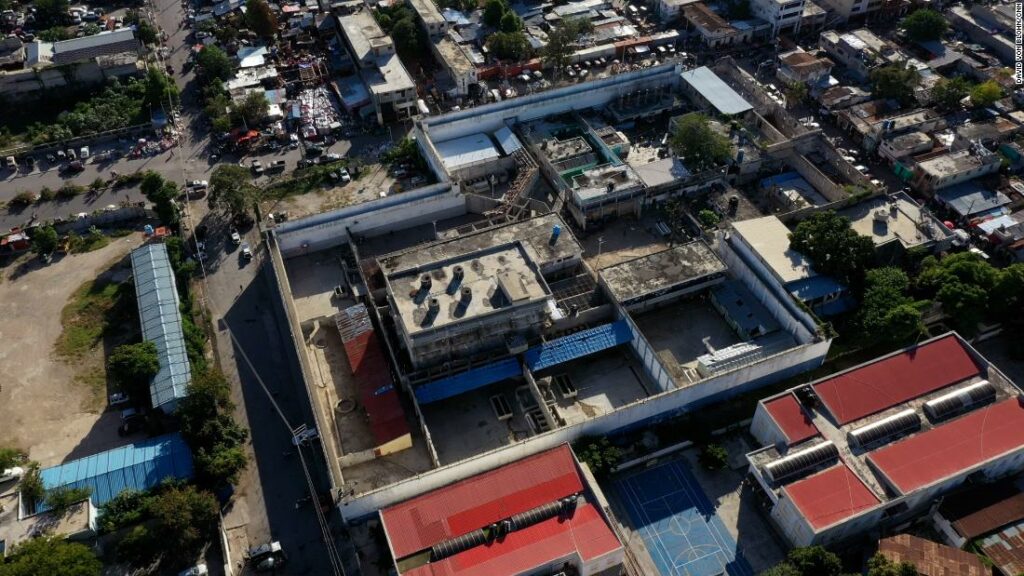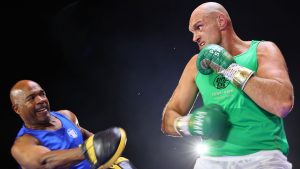Jailed for the killing of Haiti’s president, five suspected assassins say they’re innocent

CNN Exclusive: Port-au-Prince, Haiti — The smell of raw sewage and food waste permeates the air in the entrance to Haiti’s National Penitentiary in downtown Port-au-Prince.Its source is the exposed pipe that visitors must walk over as a liquid mix slides through to the street.A pat-down of even our heads from quiet security guards follows and then a large metal door swings open, revealing a courtyard on the other side. In this world exclusive, CNN came to the prison hoping to speak to a certain “I was sitting quietly, not saying a word and the officer was writing my statement for me,” said one man. “He kept looking at me and writing more even though I hadn’t said anything. They were writing and we were quiet.”He then signed a name to a document written in French, a language that he could not understand, he said.All five men alleged that they had been forced to sign declarations under duress.”The real people responsible for this are outside of the prison and we’re stuck in here. We were cheated, framed, and scammed,” said one man.Haiti’s National Police did not reply to CNN’s request for comment. Asked about the allegations of torture in police custody, a Haitian federal government spokesperson said the government “has nothing to hide” pointing out that CNN had “full permission to visit the Colombians.”The same spokesperson denied that any official testimony was recorded without the Colombians’ knowledge of what was being written.”Based on credible information, they were provided translators so they understood what to sign or not,” said the spokesman.Little food, no legal representation The five men have been held at Haiti’s National Penitentiary since late summer.The conditions in the prison are visibly horrific, with multiple men crowded into a single cell. Sanitation appeared to be an afterthought. Rats scampered across the grounds. “Our lives are worth nothing in here,” one of the Colombian prisoners told us.The men say they receive one plate of rice per day, or sometimes corn. Each says they have lost more than 30 pounds. Some are noticeably losing their hair leaving patchy clumps on their heads, a clear sign of malnutrition.”It’s inhuman what is happening to us here,” one of the men, in tears, said.Haiti’s leading human rights organization, The National Human Rights Defense Network (RNDDH), also describes general conditions in the prison as inhumane. “The prison doesn’t have enough food, gas to cook and adequate access to care despite receiving more and more prisoners in the 12 months,” they said in a report released last month.”We fully respect human rights,” said a Haitian federal government spokesperson. “We have no grudges against the Colombian prisoners.”The government did not respond to questions about why the men had not yet been formally charged.But more than five months after the assassination, none of the men have legal representation — a prerequisite to having their testimonies heard by a judge. They say the Haitian judicial system has only offered them junior lawyers with whom they could not communicate.”They sent me some lawyer in his second semester who didn’t speak Spanish,” said one of the men. “I’m not going to trust my life with him.”According to a person close to the case, the lawyers provided to represent the men were not students, but rather apprentices. Before becoming practicing lawyers, law graduates must serve what is typically a two-year apprenticeship. Though they are not fully qualified lawyers and have little experience, these apprentices are commonly appointed to represent those who cannot afford a private attorney, according to Brian Concannon, an expert with decades of experience working Haiti’s legal system.”So they are defending serious felony cases when they are not allowed to appear in a simple contract case [because they are not yet practicing attorneys],” said Concannon. “They have no budget for investigation and typically get no compensation for their time.”The men had hoped the Colombian government would provide them with some legal assistance, but that so far has not happened. Haiti’s government has also said the responsibility lies with Colombia now. “We hope government officials of Colombia provide lawyers to the prisoners so they can be examined by the judge [overseeing this case],” said a Haitian government spokesperson, adding that they cannot be officially questioned without an attorney present.The Colombian federal government in Bogotá did not respond to CNN’s request for comment, and the Colombian Embassy in Haiti referred our questions to the Foreign Ministry. A public statement from late July said Colombian government representatives met with Colombian suspects with an attorney present. However, the men we spoke to said that none of the Colombians in the prison currently have legal representation.Adding insult to injury, the men say, they have never received an explanation of the legal basis for their long detention. “At no point has someone in [the legal process] looked me in the face and said, ‘This is why you are here,'” said one of the men. “We obviously know why we’re in here but there is no rule of law or due process here. Everyone should be innocent until proven guilty and we all have rights to legal representation.”The prisoners wrapped up the hour-long conversation with a message to the international community.”Please find the love in your hearts to understand our situation and give us some benefit of the doubt,” said one man. “The best thing that could happen is that this is brought to an international tribunal. When I am out of this country, I will tell the world everything I know.”







